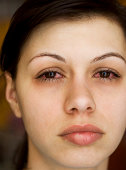 If you have a suspicion that your teen may be using illegal drugs, there are several physical and behavioral patterns you can look for. Some of which include:
If you have a suspicion that your teen may be using illegal drugs, there are several physical and behavioral patterns you can look for. Some of which include:
•Bloodshot eyes or pupils that appear larger or smaller than usual
•A change in appetite – this could be a decrease or increase in appetite
•Skipping classes or a decline in grades
•Frequent mood swings
•Neglect in personal appearance or grooming
•Incoherent or slurred speech
•Heavy use of air fresheners, incense or perfumes in rooms
•Frequent outbursts of anger or periods of hyperactivity
•Consistent disappearance of money, valuables or medication from the home
•An increase in secrecy or avoidance
Speak with your teen about these changes, approach them in a direct but calm manner. Ask them questions about changes that may be occurring in their lives, as well as questions that may uncover drug use. If your teen admits to using drugs, it is advised not to display anger but to rather show your support in finding them help and express your concern for their safety. The next step is to immediately seek treatment from a mental health professional, drug treatment program or a qualified therapist.
All content of this newsletter is intended for general information purposes only and is not intended or implied to be a substitute for professional medical advice, diagnosis or treatment. Please consult a medical professional before adopting any of the suggestions on this page. You must never disregard professional medical advice or delay seeking medical treatment based upon any content of this newsletter. PROMPTLY CONSULT YOUR PHYSICIAN OR CALL 911 IF YOU BELIEVE YOU HAVE A MEDICAL EMERGENCY.
